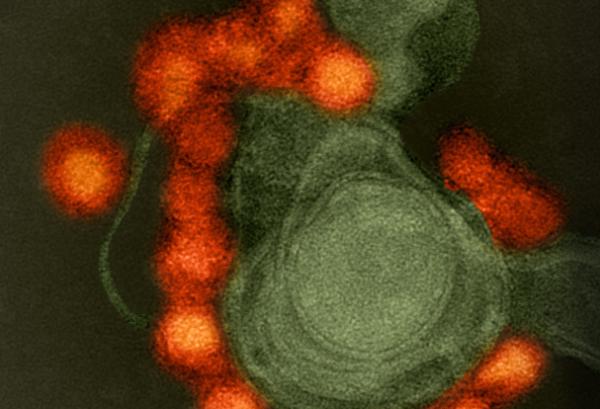
Transmission electron microscope image of negative-stained, Fortaleza-strain Zika virus (red), isolated from a microcephaly case in Brazil
NIAID is working with its partners in government, academia, and the pharmaceutical and biotechnology industries to better understand Zika virus, the disease it causes, and ways to combat it. Specifically, NIAID is accelerating research in areas such as the natural history of the disease, basic research on the Zika virus, how it causes disease (called pathogenesis), diagnostics to rapidly determine if someone is or has been infected with Zika and to distinguish from other flaviviruses, as well as treatments and vaccines.
Although Zika virus is new to the Western Hemisphere, NIAID scientists and grantees have long studied Zika relatives, such as dengue virus and West Nile virus. Those studies provide a springboard to accelerate investigations of Zika and may yield good approaches to developing therapeutics and vaccines that will combat Zika virus.
On January 22, 2016, NIAID issued a call to the research community highlighting its interest in funding research on Zika virus, including
- Developing sensitive, specific, and rapid clinical diagnostic tests for Zika virus
- Creating treatments for Zika virus and broad spectrum antiviral drugs that would be effective against multiple flaviviruses
- Developing and testing vaccines to protect against Zika virus infection and advancing new vaccination strategies
- Conducting basic research to understand Zika virus infection, replication, pathogenesis, and transmission, as well as the biology of the mosquito vectors
- Developing animal models that mimic Zika virus infection in people, so that researchers can investigate the progression of disease
- Pursuing studies on the evolution and emergence of Zika virus, including the identification of factors that affect host-range and virulence
- Performing surveillance studies of the distribution and natural history of Zika virus
- Evaluating the relative immune responses to Zika and other flaviviruses that may occur in the same geographical regions (especially dengue virus and yellow fever virus)
On February 5, 2016, the National Institutes of Health published a notice to the research community seeking to fund studies designed to investigate how Zika virus infection affects reproduction, pregnancy, and the developing fetus. Additionally, on January 17, 2017, the NIH issued a funding announcement to provide support for research on Zika virus and its complications.


